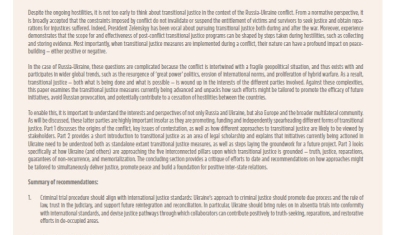MAS in Transitional Justice, Human Rights and the Rule of Law: What our Students Say
22 January 2019
In this interview, Zoë Doss, currently enrolled in the Master of Advanced Studies in Transitional Justice, Human Rights and the Rule of Law (MTJ), tells us about the programme and life in Geneva.
About Me
My name is Zoë. I’m from the United States, Ohio. In 2015, I graduated with a Bachelor of Science in Environmental Studies from the University of Cincinnati. In the last three years, I’ve worked as an educator, a camp counsellor, and a mental health specialist for incarcerated youth. I’ve volunteered my time as an activist and organizer in my community and nationally, working to support indigenous rights and end police brutality. In my free time, you might find me in the botanical gardens, at a theatrical performance, or exploring museums. I speak English and Spanish, and now that I live in Geneva, I’m learning French.
Why did you choose the MTJ at the Geneva Academy?
I believe there is truly no other programme in the world like MTJ at the Geneva Academy. I chose this programme because it attracts highly-motivated students from all over the world, and I wanted to work within an international community and be exposed to different perspectives on transitional justice.
What are you Enjoying in your Studies?
I have immense appreciation for the interdisciplinary, holistic, and exploratory approach this programme takes. For instance, when I was being interviewed as an applicant because my research interests are not particularly traditional in the field of transitional justice, I asked the Co-Directors if this could be considered as transitional justice; they told me that was up for me to tell them and push the boundaries of the field.
How is the Teaching?
Our professors, as well as valuable guest speakers, come from a range of disciplines and as such bring a spectrum of viewpoints, from boots-on-the-ground to theoretical discourse approaches, each with its own merits. All of the professors have also seemed interested in the individual development of students and been very responsive to questions, concerns, and discussion.
What are you Planning to do Next?
My goal after completing the programme is to work directly with communities and communicate human rights messages through writing or images. I want a career that allows me to retain the mind of a scholar and the heart of an activist, and I think this programme speaks directly to that.
Why Did you Choose to be Photographed in front of the MEG?
I chose to be photographed in front of the MEG (Musée d'ethnographie de Genève) because I love what it houses: a representation of the cultural diversity of humanity. Its architecture is also unique and beautiful.




